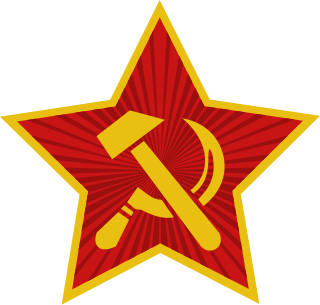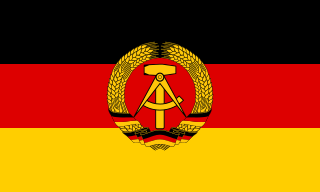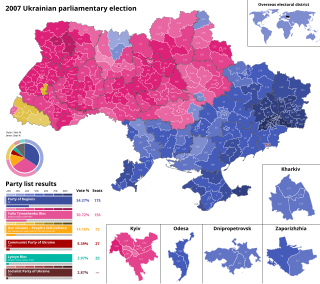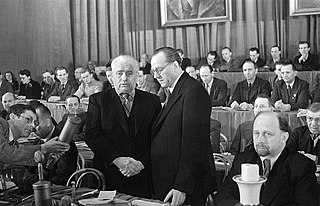
The Party of Democratic Socialism was a left-wing populist political party in Germany active between 1989 and 2007. It was the legal successor to the communist Socialist Unity Party of Germany (SED), which ruled the German Democratic Republic as the de facto sole legal party until 1990. From 1990 through to 2005, the PDS had been seen as the left-wing "party of the East". While it achieved minimal support in western Germany, it regularly won 15% to 25% of the vote in the eastern new states of Germany, entering coalition governments with the Social Democratic Party of Germany in the federal states of Mecklenburg-Vorpommern and Berlin.

The Social Democratic Party of Germany is a centre-left social democratic political party in Germany. It is one of the major parties of contemporary Germany.

The Socialist Unity Party of Germany was the founding and ruling party of the German Democratic Republic from the country's foundation in 1949 until its dissolution after the Peaceful Revolution in 1989. It was a Marxist–Leninist communist party, established in 1946 as a merger of the East German branches of the Communist Party of Germany and Social Democratic Party of Germany.

The Communist Party of Germany was a major far-left political party in the Weimar Republic during the interwar period, an underground resistance movement in Nazi Germany, and a minor party in West Germany during the postwar period until it was banned by the Federal Constitutional Court in 1956.

The Volkskammer was the supreme power organ of East Germany. It was the only branch of government in the state, and per the principle of unified power, all state organs were subservient to it.

Hans Modrow was a German politician best known as the last communist premier of East Germany.

The National-Democratic Party of Germany was an East German political party that served as a satellite party to the Socialist Unity Party of Germany (SED) from 1948 to 1989, representing former members of the Nazi Party, the Wehrmacht and middle classes. It should not be confused with the far-right National Democratic Party of Germany, which was a party in West Germany and continues as a minor non-governmental party in the modern united Germany.

The Christian Democratic Union of Germany was an East German political party founded in 1945. It was part of the National Front with the Socialist Unity Party of Germany (SED) and a bloc party until 1989.
The Soviet Military Administration in Germany was the Soviet military government, headquartered in Berlin-Karlshorst, that directly ruled the Soviet occupation zone of Germany from the German surrender in May 1945 until after the establishment of the German Democratic Republic (GDR) in October 1949.

The Liberal Democratic Party of Germany was a political party in East Germany. Like the other allied bloc parties of the Socialist Unity Party of Germany (SED) in the National Front, it had 52 representatives in the People's Chamber.
The National Front of the German Democratic Republic was officially an alliance of parties and mass organisations (1950–1990). In fact, only one party held power in the GDR, namely the communist SED. The National Front was an instrument to exercise control over the other parties and organisations. The precursor of the National Front was the Democratic Bloc.

Parliamentary elections were held in Ukraine on 26 March 2006. Election campaigning officially began on 7 July 2005. Between November 26 and 31 December 2005 party lists of candidates were formed.

The German Democratic Republic (GDR), German: Deutsche Demokratische Republik (DDR), often known in English as East Germany, existed from 1949 to 1990. It covered the area of the present-day German states of Mecklenburg-Vorpommern, Brandenburg, Berlin, Sachsen, Sachsen-Anhalt, and Thüringen. This area was occupied by the Soviet Union at the end of World War II excluding the former eastern lands annexed by Poland and the Soviet Union, with the remaining German territory to the west occupied by the British, American, and French armies. Following the economic and political unification of the three western occupation zones under a single administration and the establishment of the Federal Republic of Germany in May 1949, the German Democratic Republic was founded on 7 October 1949 as a sovereign nation.

Early parliamentary elections were held in Ukraine on 30 September 2007. The election date was determined following agreement between the President Viktor Yushchenko, the Prime Minister Viktor Yanukovych and the Chairman of the Verkhovna Rada Oleksandr Moroz on 27 May 2007, in an attempt to resolve the political crisis in Ukraine triggered by the 2 April 2007 presidential decree on dissolution of Ukraine's parliament.
A bloc party, sometimes called a satellite party, is a political party that is a constituent member of an electoral bloc. However, the term also has a more specific meaning, referring to non-ruling but legal political parties in a one-party state as auxiliary parties and members of a ruling coalition, differing such governments from pure one-party states such as Nazi Germany and the Soviet Union, although such minor parties rarely if ever constitute opposition parties or alternative sources of power. Other authoritarian regimes may also have multiple political parties which are nominally independent in order to give the appearance of political pluralism, but support or act in de facto cooperation with the government or ruling party.
General elections were held in East Germany on 15 October 1950. They were the first held since the founding of the country on 7 October 1949. There were 466 deputies in the Volkskammer, including 66 from East Berlin who were not directly elected.
The German People's Congress were a series of congresses held in Germany. They consisted of members of the Socialist Unity Party, the SED, and other political parties and mass organizations. Delegates from all over Germany gathered for the first time on 6 December 1947. Their main demand was the establishment of a German government.

The Communist Party of Germany (KPD) and the Social Democratic Party of Germany (SPD) merged to form the Socialist Unity Party of Germany (SED) on 21 April 1946 in the territory of the Soviet occupation zone. It is considered a forced merger. In the course of the merger, about 5,000 Social Democrats who opposed it were detained and sent to labour camps and jails.

The People's Democratic Front was an electoral alliance in Romania from 1944 to 1968, dominated by the Romanian Communist Party (PCR). It formed the government of Romania from 1946 to 1968, and from 1948 onward was effectively the only legal political organization in the country.

State elections were held in the Soviet occupation zone of Germany on 20 October 1946 to elect the state legislatures of Mecklenburg-Vorpommern, Brandenburg, Saxony, Saxony-Anhalt and Thuringia. They were the only elections held in the future territory of East Germany before the establishment of the German Democratic Republic in 1949, and the only free and fair elections in that part of Germany between 1932 and the Peaceful Revolution.


















